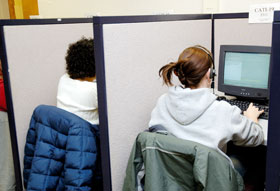  |
| HOME | THIS ISSUE | CALENDAR | GRANTS | BACK ISSUES | < BACK | NEXT > |
Center offers professional polling for academics, agenciesby Cindy Weiss - February 21, 2006 |
||||
|
Americans are divided in their opinions about the government conducting surveillance on citizens with ties to suspected terrorists. Connecticut residents are far more interested in pocketbook issues than corruption, as the 2006 campaign for governor heats up. And Farmington residents are mad about the traffic volume in town and want something done about it, right now. These are all findings from recent polls by the Center for Survey Research and Analysis (CSRA), which keeps a big ear to the ground on public issues from a state-of-the-art calling center in the Monteith Building. CSRA, which is now an independent research center in the College of Liberal Arts and Sciences, recently began a new partnership with The Hartford Courant to conduct eight public opinion surveys a year, polls that are likely to have high visibility in a gubernatorial election year. The center made news recently with its own national survey about government surveillance procedures. It also provides professional opinion polling and analyses for academics at UConn and other universities and for towns and government agencies. The center is trying to expand its outreach on campus and assist more UConn academics who use survey research in their work. “We serve a variety of purposes here,” says Sam Best, director, and associate professor of public policy. The center’s polls can facilitate research and learning, and it collects a lot of data that can be used to explore questions about health, education, and public policies. “We bring to the table expertise in survey research and design,” Best says. The self-funded CSRA also brings to bear a computer-assisted telephone interviewing operation that employs 120 students, has 40 calling stations, and is open seven days a week. Every night and weekend, callers draw out opinions on public issues. It can take thousands of calls to obtain a 500-person survey. With the prevalence of caller ID and answering machines, an interviewer may have to try five or 10 times to reach someone, says George Pettinico, associate director. Even when callers get a negative response to their request to participate in a poll, the center is often successful by trying again in a couple of days, using a senior interviewer with a fresh approach. This is called “refusal conversion,” in the language of opinion surveying. “We like rainy days and we like snowstorms because people are home,” Pettinico says. Mondays are good for evening calls, but Super Bowl Sunday was considered a lost cause by 4 p.m.
What makes the center unusual among polling organizations is its history of polling on certain questions, which lends depth to its analyses. When it recently surveyed Connecticut residents on their opinion of how Gov. M. Jodi Rell is doing her job, her record high approval rating of 74 percent could be compared with polls that CSRA conducted back to the 1980s, when William O’Neill was governor. Once part of the Roper Center, CSRA still relies on the Roper’s extensive archives of public opinion to help inform its work. Its researchers also explore how to improve the methodology of polling. Best wrote a book last year on Internet survey research methodology, for example. Best, who came to UConn six years ago from Notre Dame, and Pettinico, who earned his master’s degree in survey research from UConn and later worked in private public opinion and market research, can design the questionnaires and analyze the results, or help other academics do this. In doing so, they teach survey analysis and methodology to a corps of graduate students. “People who work with public opinion data often don’t understand how that data is generated, where it comes from,” Best says. “We believe it informs their substantive research in their fields of expertise.” Best is selective about the polls that he trusts. “I typically ignore most polls myself, because they don’t provide enough information to make an informed judgment about their quality,” he says. With the proliferation of polls in the past decade, however, polling has become a more important part of public life, he concedes. “A lot of policymakers and politicians seem to be very aware of and at times responsive to political polls,” Best notes. The role of the CSRA, besides conducting and designing polls, is to do the research that will help ensure that more polls can be viewed with confidence. Says Best, “Just because we can call a million people a night doesn’t mean that we should.” |
| ADVANCE HOME UCONN HOME |

